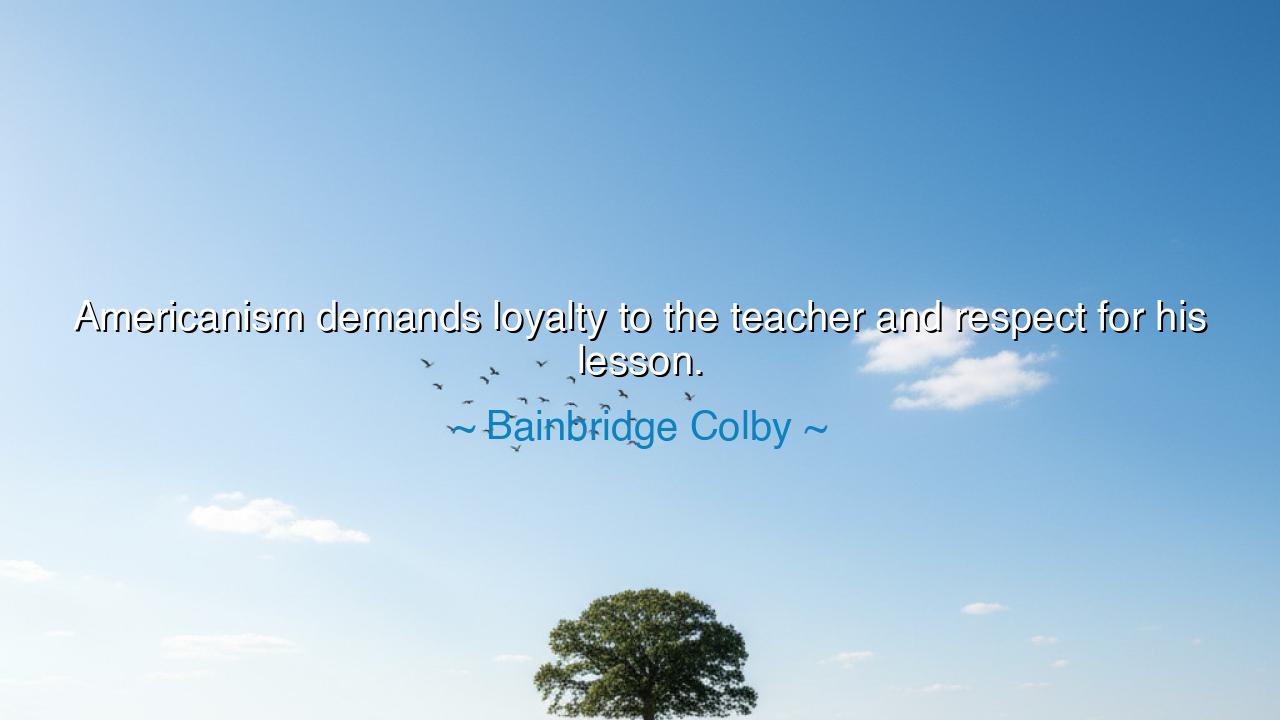
Americanism demands loyalty to the teacher and respect for his






Hearken, children of the ages, and attend to the words of Bainbridge Colby, who spoke with clarity and conviction upon the virtues that uphold a nation: "Americanism demands loyalty to the teacher and respect for his lesson." Herein lies a meditation upon the inseparable bond between education, civic virtue, and national character. Colby teaches that the health of a republic depends not merely upon laws or institutions, but upon the cultivation of minds capable of discernment, guided by the wisdom of those entrusted to instruct.
In these words, the teacher represents not only the individual who imparts knowledge, but the embodiment of guidance, moral insight, and experience. To show loyalty to the teacher is to honor the process of learning, to recognize that wisdom is earned, and to embrace instruction with humility. Likewise, to show respect for the lesson is to value the knowledge itself, and to integrate it into the soul as a compass for both thought and action. Colby asserts that a nation flourishes when its citizens understand the sacred interplay of guidance, discipline, and personal responsibility.
Consider the historical example of Thomas Jefferson, who, though a statesman and visionary, never neglected the power of learning from others. His loyalty to the lessons of his teachers, from his early schooling in Virginia to the mentorships he sought in law and philosophy, shaped the foundations of American governance. Jefferson’s respect for instruction, and his willingness to integrate wisdom into civic life, exemplifies Colby’s principle: the strength of a republic is inseparable from the cultivation of knowledge and respect for those who impart it.
Colby’s words also serve as a caution against arrogance and the erosion of authority. When students—or citizens—dismiss the guidance of their teachers, or treat lessons with irreverence, the chain of knowledge and virtue is weakened. The teacher, whose role is to illuminate, becomes undervalued, and the lessons themselves, which form the foundation of thought and civic responsibility, are imperiled. To uphold a society, one must recognize that loyalty and respect are not optional, but vital to the transmission of wisdom.
Reflect upon the life of Horace Mann, the father of American public education. He devoted himself to improving schools, training teachers, and instilling respect for learning among citizens. Mann understood that for democracy to thrive, the teacher’s authority and the lesson’s integrity must be recognized. In societies where this bond is honored, knowledge spreads, virtue flourishes, and civic life is strengthened. Colby’s insight echoes this enduring truth: Americanism and education are intertwined.
The lesson is profound: to be a citizen of conscience is to value instruction, to honor those who guide, and to integrate lessons into both action and character. Loyalty to the teacher is not blind obedience, but recognition of the sacred responsibility inherent in the act of teaching. Respect for the lesson ensures that wisdom endures, guiding generations in thought, ethics, and civic duty.
Practical action follows naturally: honor your teachers, whether in classrooms, mentorships, or life’s broader lessons. Listen attentively, apply instruction diligently, and treat knowledge with reverence. Cultivate a habit of learning that values both the guide and the guidance, understanding that the strength of a nation—its ideals, justice, and resilience—depends upon the minds and hearts of those it educates.
Thus, Bainbridge Colby’s words endure as both counsel and inspiration: "Americanism demands loyalty to the teacher and respect for his lesson." Let all who hear remember that education, virtue, and civic life are bound together, and that the flourishing of a republic rests upon the acknowledgment of wisdom, the cultivation of learning, and the honoring of those who guide the way.
If you wish, I can also craft a poetic, audio-ready version of this passage, where the cadence mirrors the rhythm of instruction, loyalty, and the passing of wisdom through generations, enhancing the emotional and heroic resonance of Colby’s insight. Do you want me to do that?






AAdministratorAdministrator
Welcome, honored guests. Please leave a comment, we will respond soon